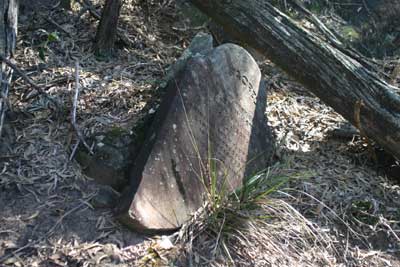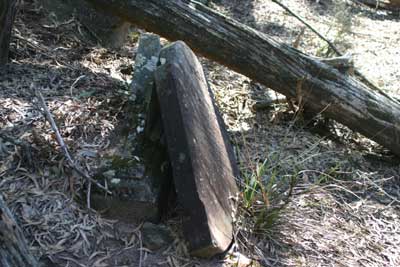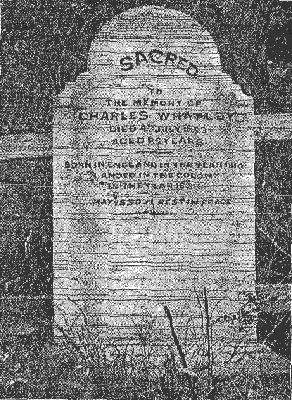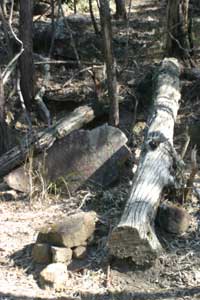| Notes: |

Above: Lone Grave of Charles Whatley
is located approximately 20 metres up the hill, south-west from the
ruins of his homestead, overlooking Whatley's Creek and the surrounding
countryside.

Above: Headstone was broken during
a storm when lightning struck a nearby tree causing it to fall onto
the headstone.
Extract from the Windsor
and Richmond Gazette. Friday, June 19, 1936:
|
PIONEER'S
GRAVE
IN
LONELY VALLEY
(By
REX ARMITAGE)
In a
lonely valley in the Colo district ... the pioneer's grave
shown in the accompanying photograph. Steep hills .. and
densely forested, ... about it. By day, the dulcet warbling
of currawong on the hillside blends with the harsh blaring
of wild duck as they swoop to the lagoon and swallows chirrup
and build their mud nests beneath the caves of the desserted
slab house where the pioneer lived: the kookburra's racious
laughter, seeming strangely irreverent ushers in the night,
and with darkness comes the ... eerie cry alternating with
the staccato yap of a prowling
|
and
bordered by a stout post and rail fence; while through the
warm summer months, the pendious leaves of rusting corn
gilttered like sabre blades in the sun.
Soon Charles Whatley was on the road to prosperity but strangely
enough he never married. In 1835, his nephew, Joseph Whatley
came from England and joined him and, from the day of his
arrival, strove to lilft the burden of work and responsibilty
from his now ageing uncle's shoulders. A hopeless task he
recently told the writer. Pioneer Charles Whatley toiled
... till the day before his death, passing peacefully away
in the early hours of the morning of the 4th July 1893,
two months before his 83rd birthday.
The farm then went to Joseph, who lived and worked there
for a further 33 years during which time he ..., when business
interests made it necessary for him
|

PIONEER
CHARLES WHATLEY'S GRAVE
|
fox.
Few are the human visitors to this lonely tomb, for "No
Roads Go By."
Charles Whatley was the pioneer, and the valley where he now
lies buried bears his named - fitting tribute to that ...
determination ehich characterised his early efforts in the
heart of that soalice-toned forest, so many acres of which
he reclaimed single handed.
Before he left England he was a carpet weaver at Wilton, (Wilts),
where he once made a carpet for Queen Victoria. Although he
came to Australia in 1833, it was not until 1847 that he took
up land in what is known as Whatley's Valley. Between trips
to the Turon and Bendigo diggings, his axe rang on the creek-side
flats. Gradually the tall bluegums and ironbarks, - the ti-tree
thickets and wattle scrub, gave place to verdant pastureland
dotted with growing cattle |
to move
to Windsor, where he still resides. The property, however
still belongs to him; being worked on shares by Mr. Arch
Jones.
On that 4th July, nearly 43 years ago, the Church of England
burial service was read at the pioneer's graveside by Samuel
Cox, a farmer, of Pitt Town, for no clergyman visited Whatley's
Valley in those days. The headstone thereon were carved
by W. J. H. Nixon, a timber getter, who it will be noticed,
omitted the "h" from the "his" in the
epitaph, Joseph Whatley saw this at the time, but did not
like to point it out to Nixon (who was perhaps an indifferent
scholar) for fear of hurting his feelings.
"May is soul rest in peace." runs its simple wording.
Yes, indeed, may your soul rest in peace. Charles Whatley,
pioneer! Your long day's work is done!
|
|


